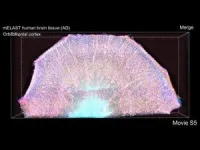(Press-News.org) The increase in the frequency and intensity of marine heatwaves in recent decades is one of the effects of global climate change. A study by the University of Barcelona, published in the Journal of Animal Ecology, shows that the extreme heatwave of 2022 caused an “unprecedented” increase in mortality of the red gorgonian Paramuricea clavata, affecting 70% of the colonies located in the Montgrí Natural Park, the Medes Islands and the Baix Ter. According to the researchers, these results are “alarming and threaten the viability” of this species of great value for the biodiversity of benthic ecosystems, since it is considered to be an inhabitant-forming species.
The UB researcher Graciel·la Rovira is the first author of this publication, which has been coordinated by Professor Cristina Linares, ICREA Academy Professor at the Faculty of Biology and the Biodiversity Research Institute of the UB (IRBio). Researchers from the Mediterranean Institute for Advanced Studies (IMEDEA, CSIC-UIB), the Institute of Marine Sciences (ICM-CSIC) and the University of Toulon (France) have also participated.
Four years with temperatures above 24.3°C
The new study has evaluated the impact of marine heatwaves, which took place between 2016 and 2022, on seven populations of the octocoral P. clavata, located in this marine protected area. The analysis of the results has shown that mortality rates (obtained from the calculation of the cumulative proportion of colonies affected and the dead surface) increased significantly the years in which these episodes were warmer and longer: 2017, 2018, 2019 and 2022.
In these four years, temperatures were higher than 24.3°C, with 2022 being the year with the highest mortality. “In 2022, the total proportion of colonies affected by the 50 days of heat wave was about 70%, with a percentage of surface area affected of almost 40%, reaching values never observed in this area as soon as the monitoring of these populations is to be initiated,” the authors note.
This negative impact is also the result of the events of previous years, since the recovery of these organisms is, according to the researchers, “very slow”. “In the mortality of a particular year, we see the mortality of the previous year too. Therefore, in 2022 it presents an accumulated mortality of all past years”, stresses Graciel·la Rovira, who is a member of the UB’s Department of Evolutionary Biology, Ecology and Environmental Sciences.
Point of no return
To date, P. clavata populations in this small marine reserve had withstood heatwaves in previous years better than other populations in the Mediterranean. This resilience had led researchers to believe that these populations could be considered a climate refuge. “The impacts documented in this study show a worrying future for P. clavata populations throughout the Mediterranean and suggest that the resilience of this species may not be enough to sustain its populations under the projected warming scenario”, the researchers note.
Moreover, these results have important implications beyond the survival of the species itself. “Since P. clavata is a habitat-forming species, that is, many other species can live thanks to it (they use it, for example, as a refuge), its disappearance could have a strong impact on the biodiversity and functioning of these ecosystems”, says Rovira.
This critical situation means that, even with the application of measures to reduce “as much impact as possible” in the protected area, the researchers are pessimistic about the possibility of the species’ recovery. “The unprecedentedly high mortality, together with the predicted climate change scenarios, means that these populations are probably at a point of no return,” concludes Graciel·la Rovira.
END
Marine heatwaves devastate red gorgonians in the Medes Islands
Point of no return
2024-06-13
ELSE PRESS RELEASES FROM THIS DATE:
Only one in 20 therapies tested in animals reach approval for human use
2024-06-13
An analysis of reviews of translational biomedical research reveals that just 5% of therapies tested in animals reach regulatory approval for human use. The study, an umbrella review, published June 13th in the open access journal PLOS Biology, summarizes other systematic reviews and provides high level evidence that while the rate of translation to human studies is 50%, there is steep drop off before final approval. The authors argue that improved robustness and generalizability of experimental approaches could help increase the chances of translation and final approval.
Animal studies are used in basic research ...
Antimalarial compounds show promise to relieve polycystic ovary syndrome
2024-06-13
Plant-derived compounds best known for their antimalarial properties relieve polycystic ovary syndrome, a major public health problem that affects millions of women worldwide. These compounds, called artemisinins, achieve their affect by suppressing ovarian androgen production in multiple rodent models as well as in a small cohort of human patients, according to a new study. The findings not only underscore the versatility of artemisinins but reveal a promising new approach for preventing and treating the disorder. Polycystic ovary syndrome (PCOS) is one of the most common ...
Canine companions are indicators of human health, but more canine data is needed
2024-06-13
In a Perspective, Courtney Sexton and Audrey Ruple discuss how companion animals, especially dogs, are distinctly positioned to be sentinels of human health due to the environments they and humans closely share, but, say the authors, systems for improving data capture around dogs’ environments are critically needed. Humans share their environments closely with companion animals, leading to similar health risks such as respiratory illnesses, cancers, and cognitive dysfunction. Dogs, having cohabitated with humans for about 30,000 years, are particularly well-suited ...
Novel platform enables unprecedented imaging of the human brain
2024-06-13
A new platform enables simultaneous capture of protein expression, cellular morphology, neural projection, and synapse distribution in large-scale human brain tissues at multiple scales, researchers report. The system ensures the preservation of cellular architecture while enabling detailed imaging and analysis of large human brain tissue samples at unprecedented resolution and speed. The authors demonstrated its utility by processing whole human brain hemispheres to reveal pathological features of Alzheimer’s disease tissue. “We envision that this scalable technology platform will ...
Technologies enable 3D imaging of whole human brain hemispheres at subcellular resolution
2024-06-13
Observing anything and everything within the human brain, no matter how large or small while it is fully intact, has been an out-of-reach dream of neuroscience for decades, but in a new study in Science, an MIT-based team describes a technology pipeline that enabled them to finely process, richly label and sharply image full hemispheres of the brains of two donors—one with Alzheimer’s and one without—at high resolution and speed.
“We performed holistic imaging of human brain tissues at multiple resolutions ...
Modifying genomes of tardigrades to unravel their secrets
2024-06-13
Some species of tardigrades are highly and unusually resilient to various extreme conditions fatal to most other forms of life. The genetic basis for these exceptional abilities remains elusive. For the first time, researchers from the University of Tokyo successfully edited genes using the CRISPR technique in a highly resilient tardigrade species previously impossible to study with genome-editing tools. The successful delivery of CRISPR to an asexual tardigrade species directly produces gene-edited offspring. The design and ...
The yuck factor counteracts sustainable laundry habits
2024-06-13
Most people today would lean towards environmentally friendly life choices, but not at the expense of being clean. When it comes to our washing habits, the fear of being perceived as dirty often wins out over the desire to act in an environmentally friendly way. And the more inclined we are to feel disgusted, the more we wash our clothes. This is shown by a unique study from Chalmers University of Technology, Sweden, that examines the driving forces behind our laundering behaviours and provides new tools for how people's environmental impact can be reduced.
Today, we wash our clothes more than ever ...
Scientists unravel drivers of the global Zinc cycle in our oceans, with implications for a changing climate
2024-06-13
The important role of the Southern Ocean in global biological processes and the carbon cycle has been confirmed anew by a study published in Science this week that, for the first time based on field evidence, reveals the underappreciated role of inorganic Zinc particles in these cycles.
The Southern Ocean plays the greatest role in global phytoplankton productivity, which is responsible for absorbing atmospheric carbon dioxide. In these processes, Zinc, present in trace quantities in seawater, is an essential micronutrient critical to many biochemical processes in marine organisms and particularly for polar phytoplankton ...
Dopamine linked to mentalising abilities
2024-06-13
A link between the neurotransmitter dopamine and the mentalising abilities of healthy people has been identified for the first time in a new study.
Mentalising describes the act of attributing and understanding mental states (such as thoughts, feelings or intentions) in other people and in oneself. Researchers at the University of Birmingham have been able to show that changing people’s brain dopamine levels affects their mentalising abilities. Their results are published today in PLOS Biology.
Dopamine ...
The scary, yet promising world of phages, the pathogen's pathogen
2024-06-13
Bacteriophages, viruses that attack and destroy bacteria, are everywhere in the natural world where they play a vital role in regulating microbe populations in ways that are not yet well understood.
New research led by the University of Utah and University College London (UCL) has found that plant bacterial pathogens are able to repurpose elements of their own bacteriophages, or phages, to wipe out competing microbes. These surprise findings suggest such phage-derived elements could someday be harnessed as an alternative to antibiotics, according to Talia Karasov, an assistant professor in the U’s School of ...
LAST 30 PRESS RELEASES:
The unprecedented transformation in energy: The Third Energy Revolution toward carbon neutrality
Building on the far side: AI analysis suggests sturdier foundation for future lunar bases
Far-field superresolution imaging via k-space superoscillation
10 Years, 70% shift: Wastewater upgrades quietly transform river microbiomes
Why does chronic back pain make everyday sounds feel harsher? Brain imaging study points to a treatable cause
Video messaging effectiveness depends on quality of streaming experience, research shows
Introducing the “bloom” cycle, or why plants are not stupid
The Lancet Oncology: Breast cancer remains the most common cancer among women worldwide, with annual cases expected to reach over 3.5 million by 2050
Improve education and transitional support for autistic people to prevent death by suicide, say experts
GLP-1 drugs like Ozempic could cut risk of major heart complications after heart attack, study finds
Study finds Earth may have twice as many vertebrate species as previously thought
NYU Langone orthopedic surgeons present latest clinical findings and research at AAOS 2026
New journal highlights how artificial intelligence can help solve global environmental crises
Study identifies three diverging global AI pathways shaping the future of technology and governance
Machine learning advances non targeted detection of environmental pollutants
ACP advises all adults 75 or older get a protein subunit RSV vaccine
New study finds earliest evidence of big land predators hunting plant-eaters
Newer groundwater associated with higher risk of Parkinson’s disease
New study identifies growth hormone receptor as possible target to improve lung cancer treatment
Routine helps children adjust to school, but harsh parenting may undo benefits
IEEE honors Pitt’s Fang Peng with medal in power engineering
SwRI and the NPSS Consortium release new version of NPSS® software with improved functionality
Study identifies molecular cause of taste loss after COVID
Accounting for soil saturation enhances atmospheric river flood warnings
The research that got sick veterans treatment
Study finds that on-demand wage access boosts savings and financial engagement for low-wage workers
Antarctica has lost 10 times the size of Greater Los Angeles in ice over 30 years
Scared of spiders? The real horror story is a world without them
New study moves nanomedicine one step closer to better and safer drug delivery
Illinois team tests the costs, benefits of agrivoltaics across the Midwest
[Press-News.org] Marine heatwaves devastate red gorgonians in the Medes IslandsPoint of no return






